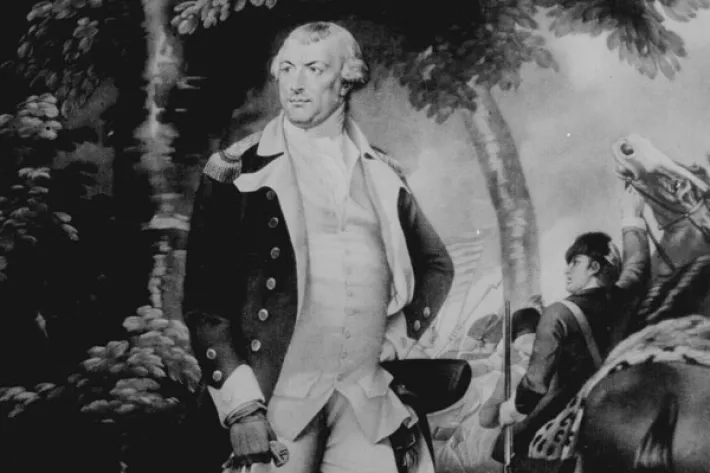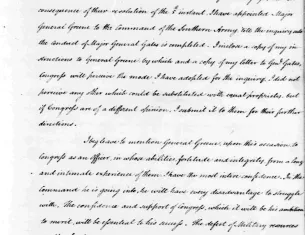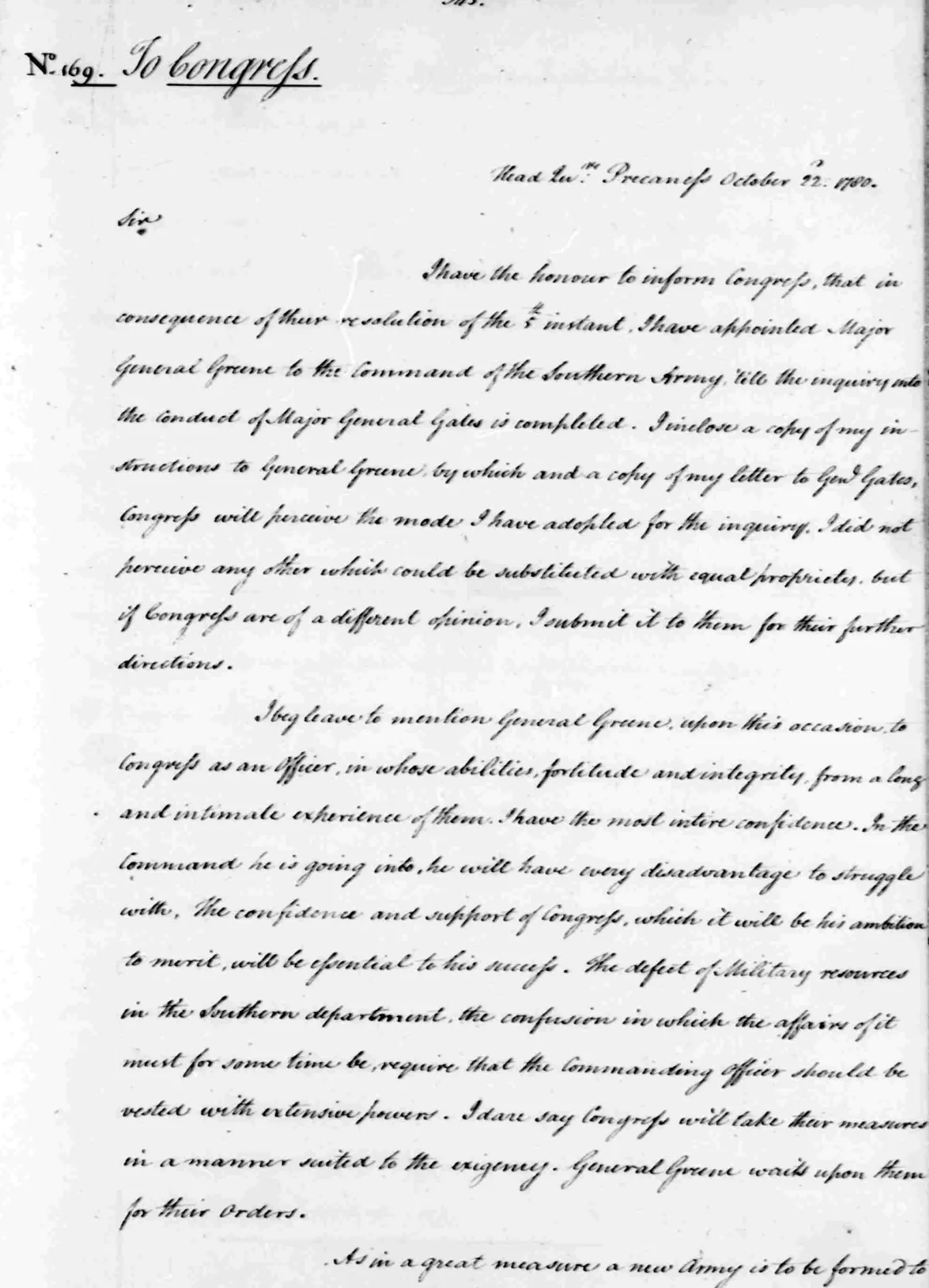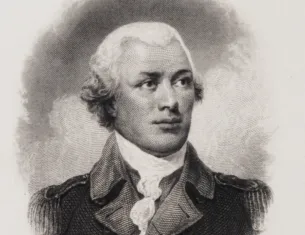Washington Appoints General Nathanael Greene to the Southern Army, 1780

Nathanael Greene by V. Green from painting by C.W. Peale (National Archives and Records Administration)
By 1778 the British had failed in their efforts to end the American Revolution in both New England and the middle colonies. They began to focus on a new strategy of “pacifying” the southern colonies. General Lord Charles Cornwallis set out to occupy territory and gain the support of colonists who remained loyal to the British cause. General Horatio Gates had been given command of the Continental Army in the South, but his one major encounter resulted in 2,000 American casualties and the death of General Baron Johann DeKalb. As a result Washington made a quick decision to replace Gates with Nathanael Greene and notified Congress of his decision in this letter on October 22, 1780.
A Letter from George Washington to Continental Congress, October 22, 1780
Head Qu.rs Precaness, October 22, 1780.
Sir
I have the honor to inform Congress, that in consequence of their resolution of the 5th instant, I have appointed Major General Greene to the command of the Southern Army, 'till the inquiry into the conduct of Major General. Gates is completed. I inclose a copy of my instructions to General Greene, by which and a copy of my letter to Genl. Gates, Congress will perceive the mode I have adopted for the inquiry. I did not perceive any other which could be substituted with equal propriety, but if Congress are of a different opinion, I submit it to them for their further directions.
I beg leave to mention General Greene, upon this occasion, to Congress as an Officer, in whose abilities, fortitude and integrity, from a long and intimate experience of them, I have the most intire confidence. In the command he is going into, he will have every disadvantage to struggle with. The confidence and support of Congress, which it will be his ambition to merit, will be essential to his success. The defect of Military resources in the Southern department, the confusion in which the affairs of it must for some time be, require that the Commanding Officer should be vested with extensive powers. I dare say Congress will take their measures in a manner suited to the exigency. General Greene waits upon them for their orders.
As in a great measure a new Army is to be formed to the Southward, the presence of the Baron De Steuben will in my opinion be of more essential utility in that quarter than here, where through the ensuing Campaign we shall have the greatest part of our force raw recruits, yet as we are organized and in some order, the sub-inspectors will suffice for the purposes of the department. I therefore submit to Congress the propriety of sending the Baron de Steuben to the Southern Army. The sooner they are pleased to announce their pleasure on this head the better. I have the honor to be with perfect respect
Your Excelly Most Obt Hum Sert
Washington
Source: George Washington to Samuel Huntington, October 22, 1780,” Founders Online, National Archives
A Letter from George Washington to Continental Congress, October 22, 1780
Head Qu.rs Precaness, October 22, 1780.
Sir
I have the honor to inform Congress, that in consequence of their resolution of the 5th instant, I have appointed Major General Greene to the command of the Southern Army, ’till the inquiry into the conduct of Major General. Gates is completed. I inclose a copy of my instructions to General Greene, by which and a copy of my letter to Genl. Gates, Congress will perceive the mode I have adopted for the inquiry. I did not perceive any other which could be substituted with equal propriety, but if Congress are of a different opinion, I submit it to them for their further directions.
I beg leave to mention General Greene, upon this occasion, to Congress as an Officer, in whose abilities, fortitude and integrity, from a long and intimate experience of them, I have the most intire confidence. In the command he is going into, he will have every disadvantage to struggle with. The confidence and support of Congress, which it will be his ambition to merit, will be essential to his success . . .
As in a great measure a new Army is to be formed to the Southward, the presence of the Baron De Steuben will in my opinion be of more essential utility in that quarter than here, where through the ensuing Campaign we shall have the greatest part of our force raw recruits, yet as we are organized and in some order . . . I therefore submit to Congress the propriety of sending the Baron de Steuben to the Southern Army. The sooner they are pleased to announce their pleasure on this head the better. I have the honor to be with perfect respect
Your Excelly Most Obt Hum Sert
Washington
Source: George Washington to Samuel Huntington, October 22, 1780, Founders Online, National Archives
propriety: suitability
fortitude: courage, strength in facing difficulty
integrity: soundness of moral character
ensuing: continuing
Background
By 1778 the British had failed in their efforts to end the American Revolution in both New England and the middle colonies. They began to focus on a new strategy of “pacifying” the southern colonies. General Lord Charles Cornwallis set out to occupy territory and gain the support of colonists who remained loyal to the British cause. General Horatio Gates had been given command of the Continental Army in the South, but his one major encounter resulted in 2,000 American casualties and the death of General Baron Johann DeKalb. As a result Washington made a quick decision to replace Gates with Nathanael Greene and notified Congress of his decision in this letter on October 22, 1780.
Transcript
A Letter from George Washington to Continental Congress, October 22, 1780
Head Qu.rs Precaness, October 22, 1780.
Sir
I have the honor to inform Congress, that in consequence of their resolution of the 5th instant, I have appointed Major General Greene to the command of the Southern Army, 'till the inquiry into the conduct of Major General. Gates is completed. I inclose a copy of my instructions to General Greene, by which and a copy of my letter to Genl. Gates, Congress will perceive the mode I have adopted for the inquiry. I did not perceive any other which could be substituted with equal propriety, but if Congress are of a different opinion, I submit it to them for their further directions.
I beg leave to mention General Greene, upon this occasion, to Congress as an Officer, in whose abilities, fortitude and integrity, from a long and intimate experience of them, I have the most intire confidence. In the command he is going into, he will have every disadvantage to struggle with. The confidence and support of Congress, which it will be his ambition to merit, will be essential to his success. The defect of Military resources in the Southern department, the confusion in which the affairs of it must for some time be, require that the Commanding Officer should be vested with extensive powers. I dare say Congress will take their measures in a manner suited to the exigency. General Greene waits upon them for their orders.
As in a great measure a new Army is to be formed to the Southward, the presence of the Baron De Steuben will in my opinion be of more essential utility in that quarter than here, where through the ensuing Campaign we shall have the greatest part of our force raw recruits, yet as we are organized and in some order, the sub-inspectors will suffice for the purposes of the department. I therefore submit to Congress the propriety of sending the Baron de Steuben to the Southern Army. The sooner they are pleased to announce their pleasure on this head the better. I have the honor to be with perfect respect
Your Excelly Most Obt Hum Sert
Washington
Source: George Washington to Samuel Huntington, October 22, 1780,” Founders Online, National Archives
Excerpt
A Letter from George Washington to Continental Congress, October 22, 1780
Head Qu.rs Precaness, October 22, 1780.
Sir
I have the honor to inform Congress, that in consequence of their resolution of the 5th instant, I have appointed Major General Greene to the command of the Southern Army, ’till the inquiry into the conduct of Major General. Gates is completed. I inclose a copy of my instructions to General Greene, by which and a copy of my letter to Genl. Gates, Congress will perceive the mode I have adopted for the inquiry. I did not perceive any other which could be substituted with equal propriety, but if Congress are of a different opinion, I submit it to them for their further directions.
I beg leave to mention General Greene, upon this occasion, to Congress as an Officer, in whose abilities, fortitude and integrity, from a long and intimate experience of them, I have the most intire confidence. In the command he is going into, he will have every disadvantage to struggle with. The confidence and support of Congress, which it will be his ambition to merit, will be essential to his success . . .
As in a great measure a new Army is to be formed to the Southward, the presence of the Baron De Steuben will in my opinion be of more essential utility in that quarter than here, where through the ensuing Campaign we shall have the greatest part of our force raw recruits, yet as we are organized and in some order . . . I therefore submit to Congress the propriety of sending the Baron de Steuben to the Southern Army. The sooner they are pleased to announce their pleasure on this head the better. I have the honor to be with perfect respect
Your Excelly Most Obt Hum Sert
Washington
Source: George Washington to Samuel Huntington, October 22, 1780, Founders Online, National Archives
propriety: suitability
fortitude: courage, strength in facing difficulty
integrity: soundness of moral character
ensuing: continuing


